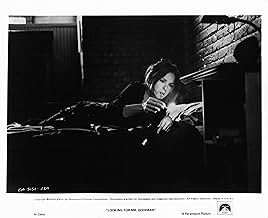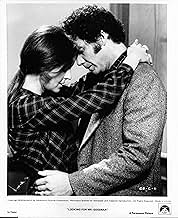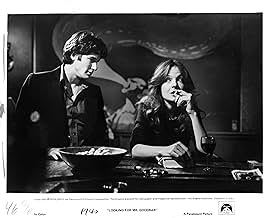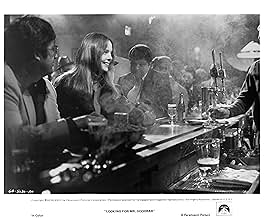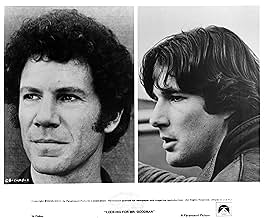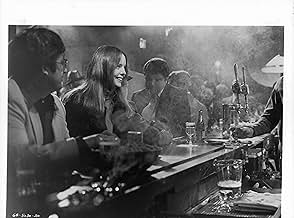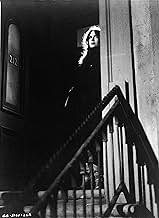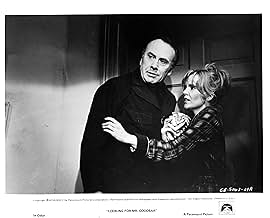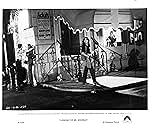Una profesora se pasa las noches de bar en bar buscando a hombres agresivos con los que tener encuentros sexuales cada vez más violentos.Una profesora se pasa las noches de bar en bar buscando a hombres agresivos con los que tener encuentros sexuales cada vez más violentos.Una profesora se pasa las noches de bar en bar buscando a hombres agresivos con los que tener encuentros sexuales cada vez más violentos.
- Nominado para 2 premios Óscar
- 1 premio y 6 nominaciones en total
Argumento
¿Sabías que...?
- CuriosidadesTom Berenger admitted in an interview that he had nightmares after he was finished shooting all of his scenes as Gary.
- PifiasTheresa is supposed to be a first-grade teacher, but all her students look to be way older. The youngest seem to be 9 or 10 while the oldest could be 12, 13 or even older.
- Créditos adicionalesThe Paramount logo is shortened at both ends, fading in at the point the text already appears. It was gray-scaled in the closing version.
- ConexionesFeatured in Sex, Censorship and the Silver Screen: Forward Into the Past (1996)
- Banda sonoraTry Me, I Know We Can Make It
Written by Donna Summer (uncredited), Giorgio Moroder (uncredited) and Pete Bellotte (uncredited)
Performed by Donna Summer
Courtesy of Casablanca Record & FilmWorks
Reseña destacada
Few viewers can deny the impact of this film on the '77 crowd and generations afterwards. As a curious 8-year-old up late watching HBO, I never forgot the story or the lesson. Based on a true story, Richard Brooks astutely translated Judith Rossner's best-selling novel to screen, choosing a luminous Diane Keaton, hot off `Annie Hall' and `The Godfather' to play Theresa Dunn, an up-and-coming Richard Gere, a quirky Tuesday Weld , and amazing Richard Kiley as Dunn, the overbearing Irish-Catholic father. The misogynistic Richard Atherton and an ominous Tom Berenger rounds out the solid cast.
Neither traditionally beautiful like her stewardess sister, Katherine or a baby factory like her other sister living at home with her, Theresa is the odd one out, the sister who is searching for approval from a father who barely acknowledges her existence. Childhood traumas mold her and make the fact that Theresa allows herself to be strong and fallible all the more powerful and endearing.
Tired of her father's unyielding rule, Theresa moves into the apartment building owned by Katherine's next attempt at a husband. As the women's freedom movement is underway, Theresa is caught in the position of questioning the traditional roles for women, roles against a new woman in control of her body and her sexuality. By day she teaches at a school for the deaf. By night her nightly jaunts into New York's seamier nightlife scene, expose the dichotomy of being a professional woman by day who must maintain credibility and responsibility, especially with young children while trying to be sexually active, experimental and suffering the stigma attached to both as whore and as a free woman wanting purely physical experiences much the same as men, yet realizing the label is different.
Throughout this film, Brooks explores Theresa's perpetual search for acceptance by men but a need to maintain her own identity. From a failed affair with a Prof. she was a TA to, to her fling with Tony, a local hustler, Theresa is perpetually in question of her sexuality and her allure for men, making poor choices in her partners only to endure their violence and possessiveness - much like her father. That she meets up with a homicidal drifter the New Year's Eve night she has decided to quit drugs and cruising, is the irony of her self-discovery.
The only positive male in her life appears to be is LaVar Burton's character, Cap Jackson, the sullen brother of one of Theresa's students. He is the only male presence in the movie that is not malevolent or trying to extract something from Theresa and during her altercation with Tony at the school, he is the only person to defend and protect her.
While the scare of AIDS stole later generations' promiscuity, this tale still resonates for viewers, especially for women on their own, looking for intimacy yet craving isolation.
While the ending tends to drag with one too many drug scenes the movie still packs a wallop for a finale.
Neither traditionally beautiful like her stewardess sister, Katherine or a baby factory like her other sister living at home with her, Theresa is the odd one out, the sister who is searching for approval from a father who barely acknowledges her existence. Childhood traumas mold her and make the fact that Theresa allows herself to be strong and fallible all the more powerful and endearing.
Tired of her father's unyielding rule, Theresa moves into the apartment building owned by Katherine's next attempt at a husband. As the women's freedom movement is underway, Theresa is caught in the position of questioning the traditional roles for women, roles against a new woman in control of her body and her sexuality. By day she teaches at a school for the deaf. By night her nightly jaunts into New York's seamier nightlife scene, expose the dichotomy of being a professional woman by day who must maintain credibility and responsibility, especially with young children while trying to be sexually active, experimental and suffering the stigma attached to both as whore and as a free woman wanting purely physical experiences much the same as men, yet realizing the label is different.
Throughout this film, Brooks explores Theresa's perpetual search for acceptance by men but a need to maintain her own identity. From a failed affair with a Prof. she was a TA to, to her fling with Tony, a local hustler, Theresa is perpetually in question of her sexuality and her allure for men, making poor choices in her partners only to endure their violence and possessiveness - much like her father. That she meets up with a homicidal drifter the New Year's Eve night she has decided to quit drugs and cruising, is the irony of her self-discovery.
The only positive male in her life appears to be is LaVar Burton's character, Cap Jackson, the sullen brother of one of Theresa's students. He is the only male presence in the movie that is not malevolent or trying to extract something from Theresa and during her altercation with Tony at the school, he is the only person to defend and protect her.
While the scare of AIDS stole later generations' promiscuity, this tale still resonates for viewers, especially for women on their own, looking for intimacy yet craving isolation.
While the ending tends to drag with one too many drug scenes the movie still packs a wallop for a finale.
- mollylane
- 30 mar 2001
- Enlace permanente
Selecciones populares
Inicia sesión para calificar y añadir a tu lista para recibir recomendaciones personalizadas
Detalles
Taquilla
- Recaudación en Estados Unidos y Canadá
- 22.512.655 US$
- Fin de semana de estreno en EE. UU. y Canadá
- 1.540.635 US$
- 23 oct 1977
- Recaudación en todo el mundo
- 22.512.655 US$
- Duración2 horas 16 minutos
- Mezcla de sonido
- Relación de aspecto
- 1.85 : 1
Contribuir a esta página
Sugerir un cambio o añadir el contenido que falta

Principal laguna de datos
By what name was Buscando al señor Goodbar (1977) officially released in India in Hindi?
Responde
